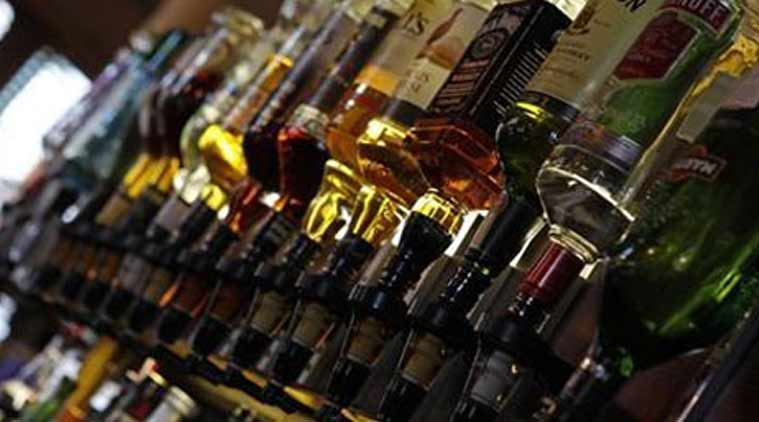 The images of people crowding wine shops by the hordes all over the country went viral on social media on Monday. In Mumbai, a day later the BMC asked wine shops to down their shutters again. (Representational image)
The images of people crowding wine shops by the hordes all over the country went viral on social media on Monday. In Mumbai, a day later the BMC asked wine shops to down their shutters again. (Representational image)
Before the first three weeks of the nationwide lockdown were up on April 14, Dr Shubhangi Parkar, a de-addiction specialist and Professor Emeritus at the de-addiction centre at the KEM Hospital in Mumbai, heard from the wife of a patient after a gap of two years.
The woman, a teacher, wept profusely over the phone and said that her husband, a post-graduate with a well-paying job, had hit their 16-year-old daughter.
“For almost two years he was sober but his wife told me he had started drinking again over the last six or seven months. He had his stock for eight to ten days but this happened when it got over. He is a good man. Even his wife and daughters say so but when he hit the daughter she called me and we learnt that these may be withdrawal symptoms,” said Parkar, whose intervention and the availability of the prescribed medication helped control the situation.
This was, however, no standalone case. The images of people crowding wine shops by the hordes all over the country went viral on social media on Monday. In Mumbai, a day later the BMC asked wine shops to down their shutters again. However, what is missing from the debate around opening wine shops or not, medical professionals feel, is looking at alcohol dependence as a medical condition without moral baggage.
Parkar explained that while a large number of people who consume alcohol may have mild to moderate dependence that can be controlled with hydration and nutrition, but about 20 per cent fall in the high-risk group that may suffer from complicated or protracted withdrawal symptoms in the absence of alcohol.
“When the lockdown started, as a de-addiction specialist, I was worried. For the high-risk, vulnerable group, the craving is biological and if the patient reaches the stage of delirium tremens (DTs) – a severe form of withdrawal symptom – it is always worrying and it has high mortality,” said Parkar.
Dr Yusuf Merchant, founder and president of Drug Abuse Information, Rehabilitation and Research Centre (DAIRRC), said that at the stage of DTs, one in ten persons dies and it is surprising that no such death has been reported during the lockdown period.“Delirium tremens is the stage at which a person’s hands start to shake. It is harrowing for their families. Unlike a drug addict, an alcohol addict who has an electrolyte imbalance needs IV supplements,” said Merchant.
He added that with people thronging wine shops as soon as they were opened, had put everyone including policemen managing the crowd at the risk of COVID-19 infection.
“Home delivery of alcohol should be permitted and that should be the end of the story,” he said, adding that the “government can up the price of alcohol by 200 per cent if it wants to and use the funds for augmenting medical infrastructure to battle the global pandemic because those dependent on alcohol will buy it at any price.”
“Alcohol in itself is not bad. It is bad if you are an alcoholic, like sugar is not bad but it is bad if you are diabetic. Alcoholism is like any other disease, like typhoid or malaria, but in a lockdown, no cop is going to allow an alcohol dependent person to go buy alcohol. If he had a heart condition, he may be allowed to go to the chemist. So, if home delivery of alcohol is allowed, it will make a huge difference.”
Merchant said the de-addiction centre near Kalyan was under quarantine and no one from outside was allowed during the lockdown as it would require COVID-19 screening. Parkar said that treatment at the KEM de-addiction was also not advisable during the lockdown as it would be risky for patients who may already have a weak respiratory system or a damaged liver to step out of their homes amid the threat of COVID-19.
Bhaskar S of the Alcoholics Anonymous (AA), Mumbai Region, however, said that making alcohol available could undo what this lockdown might have achieved by forcing many alcoholics to abstain. In chronic cases, he said, a person could always be taken to a doctor or a hospital.
In the Mumbai region, while there might be about 15,000 members of the AA, at least 250-300 regularly attend daily AA meetings held in about 12 centres from Colaba to Govandi, Bhiwandi and Palghar. Amid the lockdown, meetings have moved online and have seen larger participation with people joining in from other countries as well. In India, he said, about 10-12 per cent AA members are women.
He said many alcoholics sober up during the Hindu holy month of Shravan but as soon as the last puja is done, they get back to drinking. The situation during the prevailing lockdown has been similar, he said.
“This lockdown has helped many people become sober, even if it may be forced sobriety. This period could have been better if we could have reached out and given the message of abstinence, which was not possible because of the lockdown. During the period of abstinence, an alcoholic may be better placed to listen and realise which bracket he stands in. When cravings are strong, he may not. This situation could have been favourable if these people could be reached,” said Bhaskar.